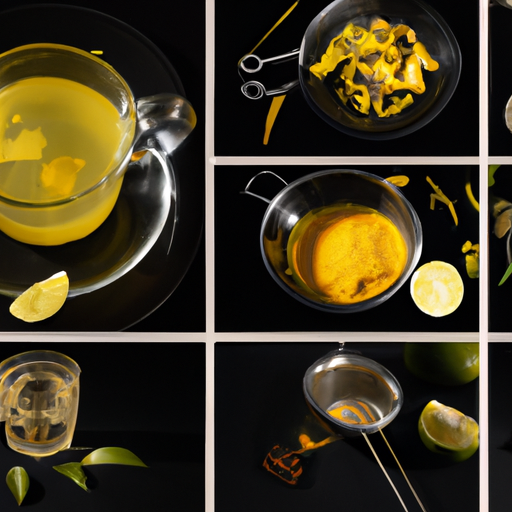Did you know that turmeric tea has gained popularity as a natural remedy for various health conditions? According to research, turmeric contains a compound called curcumin, which has potential anti-inflammatory and antioxidant properties. However, before you start sipping on this golden beverage, it is important to be aware of its disadvantages.
One interesting statistic to consider is that turmeric tea may have potential interactions with certain medications. This is due to its ability to inhibit drug-metabolizing enzymes in the liver, which can affect the effectiveness of some drugs. Additionally, turmeric tea may cause allergic reactions in some individuals, leading to symptoms such as skin rashes or difficulty breathing.
Moreover, consuming turmeric tea in excessive amounts can lead to digestive issues such as bloating, gas, or diarrhea. It is also worth noting that turmeric tea may increase the risk of kidney stones in certain individuals, especially those who are prone to developing them.
Furthermore, turmeric tea has the potential to stain your teeth and skin, so caution should be exercised to prevent discoloration. Additionally, it may lower iron absorption, which can be problematic for individuals with iron deficiency anemia.
Lastly, pregnant women and breastfeeding mothers should exercise caution when consuming turmeric tea, as its safety in these populations is still uncertain.
In conclusion, while turmeric tea offers potential health benefits, it is important to be aware of its potential disadvantages and to consult with a healthcare professional before incorporating it into your routine.
Key Takeaways
- Turmeric tea may interact with certain medications, inhibiting drug-metabolizing enzymes in the liver.
- Excessive consumption of turmeric tea can lead to digestive issues such as bloating, gas, and diarrhea.
- Turmeric tea may increase the risk of kidney stones in certain individuals.
- Turmeric tea has the potential to stain teeth and skin.
Possible Interactions with Medications
Be cautious when consuming turmeric tea as it may interact with your medications, potentially reducing their effectiveness. Turmeric contains a compound called curcumin, which has been found to interfere with certain medications.
For example, turmeric may increase the risk of bleeding when taken with blood thinners like warfarin or aspirin. It may also interact with drugs that are metabolized by the liver, such as statins or certain antidepressants, leading to increased or decreased levels in the blood. These interactions can result in potential side effects or reduced effectiveness of the medications.
It’s important to consult with your healthcare provider before adding turmeric tea to your routine, especially if you’re taking any medications.
Transitioning into the next section, it’s also important to be aware of potential allergic reactions that turmeric tea can cause.
Allergic Reactions
When it comes to allergic reactions, there are two key points to consider: contact dermatitis and respiratory allergies.
Contact dermatitis refers to a skin reaction that occurs when the skin comes into direct contact with an allergen. This can result in redness, itching, and a rash.
Respiratory allergies, on the other hand, occur when allergens are inhaled and can lead to symptoms such as sneezing, coughing, and difficulty breathing.
Contact dermatitis
If you’re not careful with turmeric tea, it can cause contact dermatitis, a skin condition that affects up to 5% of the population and can leave you feeling itchy, irritated, and frustrated.
Turmeric contains certain compounds that have irritant properties, which can lead to skin inflammation when it comes into contact with sensitive skin. Here are four reasons why contact dermatitis can occur:
-
Sensitivity: Some individuals may have a higher sensitivity to turmeric, making them more prone to developing contact dermatitis.
-
Prolonged exposure: Continuous and prolonged contact with turmeric tea can increase the risk of developing skin irritation.
-
Concentrated form: Using higher concentrations of turmeric in the tea can intensify its irritant effects on the skin.
-
Pre-existing skin conditions: People with existing skin conditions like eczema or psoriasis may be more susceptible to developing contact dermatitis from turmeric tea.
Moving forward, let’s discuss the potential respiratory allergies that can arise from consuming turmeric tea.
Respiratory allergies
Explore the delightful world of turmeric tea, but be mindful of potential respiratory allergies that may arise from indulging in this aromatic beverage. For individuals with pollen sensitivity or asthma management concerns, turmeric tea may trigger respiratory symptoms such as coughing, wheezing, and shortness of breath. It is important to note that these reactions are relatively rare, but it is always wise to exercise caution. To better understand the potential risks, let’s take a closer look at the relationship between turmeric tea and respiratory allergies.
| Turmeric Tea and Respiratory Allergies | |||
|---|---|---|---|
| Potential Triggers | Symptoms | Precautions | Management |
| Pollen sensitivity | Coughing, wheezing, shortness of breath | Consult with a healthcare professional | Avoid exposure to allergens |
Now, let’s move on to the next section and explore the potential digestive issues associated with turmeric tea.
Digestive Issues
Not only does turmeric tea provide a warm and soothing drink, but it can also aggravate digestive issues, making it a less than ideal choice for those with sensitive stomachs. While turmeric is known for its anti-inflammatory properties, it can also stimulate the production of gastric acid, which can lead to stomach upset and even diarrhea in some individuals.
This is especially true when consumed in excessive amounts or on an empty stomach. It’s important to note that these effects may vary from person to person, and some individuals may be more sensitive to the digestive side effects of turmeric tea. Therefore, if you have a history of digestive issues or a sensitive stomach, it’s advisable to consult with a healthcare professional before incorporating turmeric tea into your diet.
Moving on to the next topic, turmeric tea has also been associated with an increased risk of kidney stones.
Risk of Kidney Stones
Beware of excessive consumption of turmeric tea as it can potentially increase the likelihood of developing kidney stones. While turmeric tea has many health benefits, it is important to be aware of the risk factors associated with its consumption. Kidney stones are hard deposits that form in the kidneys and can cause severe pain and discomfort. Studies have shown that high levels of oxalates in turmeric can contribute to the formation of kidney stones. To prevent this, it is recommended to limit the intake of turmeric tea, especially for individuals who are already at risk for kidney stones. Additionally, drinking plenty of water and maintaining a balanced diet can help reduce the chances of developing kidney stones. Now, let’s move on to the next topic: the staining of teeth and skin.
Staining of Teeth and Skin
Drinking turmeric tea can give your teeth and skin a vibrant golden glow that’ll make you shine like the sun. However, while some may find this appealing, others may see it as a disadvantage due to potential tooth and skin discoloration. Here are four things to consider:
-
Tooth discoloration: The pigment in turmeric, called curcumin, can cause yellow stains on teeth over time. Regular consumption of turmeric tea may lead to a less desirable smile.
-
Skin discoloration: Turmeric has been used for centuries as a natural dye. While it may be beneficial for some skin conditions, prolonged exposure can result in yellowish stains on the skin.
-
Prevention: To minimize tooth discoloration, it’s recommended to brush your teeth immediately after consuming turmeric tea. Additionally, using a straw can help reduce contact between the tea and your teeth.
-
Skin care: If you’re concerned about skin discoloration, it’s advisable to apply a thin layer of petroleum jelly or coconut oil on exposed areas before drinking turmeric tea. This can act as a barrier and prevent stains from setting in.
Considering the potential tooth and skin discoloration, it’s important to be aware of these effects before incorporating turmeric tea into your daily routine. Moving on to the next section, let’s explore the impact of turmeric tea on lowered iron absorption.
Lowered Iron Absorption
One thing to keep in mind is that incorporating turmeric tea into your daily routine may impact your body’s ability to absorb iron. Iron is an essential mineral that plays a crucial role in transporting oxygen throughout your body. However, turmeric contains compounds called polyphenols, which can bind to iron and inhibit its absorption in the intestines. This can be a concern for individuals who already have low iron levels or are at risk of iron deficiency or anemia. It is important to note that while turmeric tea may have numerous health benefits, it is always wise to consume it in moderation and consider balancing it with other iron-rich foods or supplements. Moving forward, it is also important to discuss precautions for pregnancy and breastfeeding.
Pregnancy and Breastfeeding Precautions
It’s important to note that when expecting or nursing, it’s advisable to exercise caution and consult with a healthcare professional before incorporating turmeric into your diet. While turmeric is generally considered safe for consumption, there are some precautions to consider during pregnancy and breastfeeding.
Turmeric contains compounds that may affect hormonal balance, which is crucial during these periods. Although there is limited research on the effects of turmeric tea specifically, it’s always best to err on the side of caution. Some experts recommend avoiding high doses of turmeric or turmeric supplements during pregnancy, as it may stimulate the uterus or disrupt hormonal balance.
Additionally, there is a lack of evidence regarding the safety of turmeric in breastfeeding women. Therefore, it’s important to consult with a healthcare professional to ensure the safety and wellbeing of both mother and baby.
Frequently Asked Questions
Can turmeric tea interact with specific medications?
Yes, turmeric tea can interact with specific medications. It may increase the effects of blood thinners, increasing the risk of bleeding. It may also interact with diabetes medication, affecting blood sugar levels.
What are the symptoms of an allergic reaction to turmeric tea?
Allergic reactions to turmeric tea can be absolutely dreadful! Symptoms may include severe itching, hives, swelling, and even difficulty breathing. These side effects should not be taken lightly and immediate medical attention is necessary.
Can turmeric tea cause digestive issues such as bloating or diarrhea?
Yes, turmeric tea can cause digestive issues such as bloating or diarrhea in some individuals. However, it is important to note that turmeric tea has been associated with weight loss and has benefits for the skin.
Is there a risk of developing kidney stones from consuming turmeric tea?
There is no evidence to suggest that consuming turmeric tea poses a risk of developing kidney stones. Studies have shown that turmeric can actually help prevent kidney stone formation by reducing calcium oxalate crystal growth.
Can turmeric tea stain your teeth and skin?
Turmeric tea can potentially stain teeth and skin due to its vibrant yellow color. However, some people use it as a skincare remedy and claim it can help with teeth whitening.
Conclusion
In conclusion, turmeric tea, while known for its many health benefits, does come with some potential disadvantages. It may interact with certain medications and cause allergic reactions in some individuals. Digestive issues, risk of kidney stones, and staining of teeth and skin are also possible concerns. Additionally, turmeric tea may lower iron absorption and should be used with caution during pregnancy and breastfeeding.
It’s important to consider these potential drawbacks and consult with a healthcare professional before incorporating turmeric tea into your daily routine.










